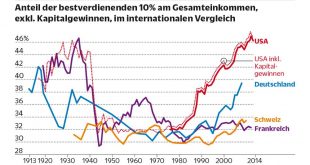In the AEJ: Economic Policy, Christopher Hoy and Franziska Mager report that people are less supportive of redistribution when they learn that they are poorer than they thought. We test a key assumption underlying seminal theories about preferences for redistribution, which is that relatively poor people should be the most in favor of redistribution. … people who are told they are relatively poorer than they thought are less concerned about inequality and are not more supportive of...
Read More »Wealth Inequality and Wealth Taxes
In a series of blog posts, John Cochrane criticizes the Saez-Zucman proposal for higher wealth taxes. In posts #1 to #4 he argues that economic arguments for wealth taxes are inconsistent or not convincing. In post #5 he concludes that Saez-Zucman truly are motivated by political objectives which are grounded in the view that wealth of the rich is ill-gotten or that the rich have a disproportionate, negative influence on politics. Saez and Zucman want to confiscate billionaires’ wealth,...
Read More »Monetary Policy and the Wealth Distribution
In a Staff Working Paper, the Bank of England’s Philip Bunn, Alice Pugh, and Chris Yeates discuss how monetary policy easing following the financial crisis affected income and wealth of different age groups. The authors analyze survey panel data (ONS Wealth and Assets Survey) on households’ characteristics and balance sheet positions. They argue that the overall effect of monetary policy on standard relative measures of income and wealth inequality has been small. Given the pre-existing...
Read More »Inequality in the United States
… meanwhile, inequality in the US remains more of an issue. On Alphaville, Kadhim Shubber summarizes a DB Global Markets Research study on US inequality: More than 30% of US households have zero or negative non-home wealth. Wealth is increasingly concentrated among the old, and among the wealthy. Observers paint the picture of an increasingly dysfunctional society. And they point to the relevance of inequality for political polarization and accountability.
Read More »Inequality in Switzerland
In a paper, Reto Föllmi and Isabel Martínez document trends in income and wealth inequality in Switzerland over the last 100 years. Daniel Hug reports in the NZZaS (figures below taken from NZZaS). Data (World Wealth and Income Database, based on tax records). Some findings: Income inequality has been rather stable and is modest … … although social mobility as reflected in educational attainment is low. Income inequality at the very top has increased. The top 1% of income recipients earn...
Read More »Tax Evasion and Tax Rates
High rates of tax evasion are not necessarily a consequence of high tax rates. In an NBER working paper, Annette Alstadsæter, Niels Johannesen, and Gabriel Zucman provide estimates of countries’ wealth holdings in “tax havens.” Based on BIS statistics the authors find that: Wealth on the order of 10% of global GDP is held offshore. In Scandinavia, the number is much smaller. In continental Europe, it equals roughly 15%. In some Gulf and Latin American countries, almost 60%. In Russia, the...
Read More »Tax Evasion and Wealth Inequality
The Economist reports about a study by Annette Alstadsæter, Niels Johannesen and Gabriel Zucman who matched leaked information from Swiss banks and Panamanian shell companies with Scandinavian wealth records. Their findings: Tax evasion is progressive. The average / top 1% / top 0.01% Scandinavian household paid 3% / 10% / 30% fewer taxes than it should. Accordingly, estimates of wealth inequality (based on tax data) likely underestimate the degree of inequality.
Read More »Historical Wealth and Income Data
The World Wealth and Income Database.
Read More »Owner-Occupied Housing and Wealth Inequality
On VoxEU, Gianni La Cava summarizes his research on the secular rise in the housing share of US income. In the US national accounts, income accruing to the housing sector is measured as ‘net housing capital income’, or simply, net rental income (i.e. gross rents less housing costs, such as depreciation and property taxes). This measure includes rental income going to both owner-occupiers (imputed rent) and landlords (market rent). The very detailed nature of the Bureau of Economic...
Read More »Taxing the Rich
In Taxing the Rich: A History of Fiscal Fairness in the United States and Europe, Kenneth Scheme and David Stasavage explore the intellectual and political debates surrounding the taxation of the wealthy while also providing the most detailed examination to date of when taxes have been levied against the rich and when they haven’t. Fairness in debates about taxing the rich has depended on different views of what it means to treat people as equals and whether taxing the rich advances or...
Read More » Swiss Economicblogs.org
Swiss Economicblogs.org


